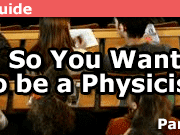Your Curriculum Vitae As a Physics Graduate
Full Chapter List - So You Want To Be A Physicist... Series
Part I: Early Physics Education in High schools
Part II: Surviving the First Year of College
Part III: Mathematical Preparations
Part IV: The Life of a Physics Major
Part V: Applying for Graduate School
Part VI: What to Expect from Graduate School Before You Get There
Part VII: The US Graduate School System
Part VIII: Alternative Careers for a Physics Grad
Part VIIIa: Entering Physics Graduate School From Another Major
Part IX: First years of Graduate School from Being a TA to the Graduate Exams
Part X: Choosing a Research area and an advisor
Part XI: Initiating Research Work
Part XII: Research work and The Lab Book
Part XIII: Publishing in a Physics Journal
Part XIV: Oral Presentations
Part XIII: Publishing in a Physics Journal (Addendum)
Part XIV: Oral Presentations – Addendum
Part XV – Writing Your Doctoral Thesis/Desertation
Part XVI – Your Thesis Defense
Part XVII – Getting a Job!
Part XVIII – Postdoctoral Position
Part XIX – Your Curriculum Vitae
I am going to backtrack a little bit and talk about writing your Curriculum Vitae (CV) and what you should focus on in search of a job in physics. This includes looking for a Postdoctoral position, a research position, and possibly a faculty position at a university.
I am going to base this on my own personal experience in hunting for jobs, my conversation with others who were in my position, my discussion with other supervisors who were looking for candidates for a position, and my own experience in browsing applicants’ CV to fill a couple of positions. I would say that most physics applicants do not pay that keen attention to their CV, and one sometimes wonders if they are truly interested in a particular position that they are applying for.
Here are the items that MUST appear on your CV:
1. Name, mailing address, e-mail address, phone number;
2. A brief (one short paragraph, or even just a sentence) on your goal;
3. Your educational background. List in reverse chronological order, i.e. the last degree obtained first.
4. Your skills, expertise, and knowledge;
5. Other awards, recognition;
6. List of publications (if there are too many, list the more important ones, or the ones relevant to the job you are applying to).
Try not to exceed more than 2 pages. Keep in mind that people who are reading this have to read a lot of other CVs from other applicants. If it is too long, one loses interest very quickly.
Most of what I’ve listed above is pretty self-explanatory, and most applicants know what to write, except for #4. This is what I will try to discuss in the rest of this chapter. From what I have read of a number of CVs lately, this is where many applicants drop the ball.
Most CVs that I’ve received wrote way too much on the “physics” content. Now, such a thing may be appropriate in some circumstances, especially if you’re applying in the very exact, same area of knowledge as your research area. The person who is hiring would probably know the subject matter quite well and would be very interested in it. However, this is also not very common. What occurs most of the time is that you are applying for a position, especially for a postdoc position, in which the subject area is a bit different, sometimes VERY different, then the subject area that you majored in. What is in common are the skills and expertise that you have that the potential employer is looking for. So HIGHLIGHT THE EXPERTISE AND THE SKILLS in the CV! Don’t bury it under lots of physics and don’t simply mention it in passing. Not only are you not showing to the potential employer what he/she is looking for, but it also shows that you simply sent out a generic CV without bothering to tailor it to this particular job position. I had that impression many times while reading several CVs.
Let’s do an example. Say I’m looking for someone who can make photocathodes for some particular application. Now, I’m not looking for someone with an exact background who majored in photocathode physics, because it isn’t a common area of specialization, and there probably aren’t that many students who graduated with that knowledge. However, I am looking for someone who has the expertise to make material fabrication. In particular, I’m looking for someone who has the expertise to make thin films of semiconductors, using various deposition techniques, especially chemical vapor deposition (CVD).
Unfortunately, it was hard to find that in many of the CVs that I read. Most of the CV talked about the physics (or chemistry) of the material, what was studied, how the physics was important, etc. In cases where the applicants did mention making thin films, they skimped on the details. I would say something like this: “Ability to make thin films for XRD and XPS studies to arrive at the strain-stress effects on the band structure”. Yes, what WHAT did you use to make the thin films? That is what I am looking for, and you had just glossed over that piece of information! The strain-stress effects on band structure are the “physics”, and unless you are applying for a research position in which THAT is one of the areas of study for that open position, the potential employer probably cares VERY little about that useless fact.
Instead, what the applicant should have done is say something like “Ability to fabricate metals and semiconductor thin films using MOCVD, producing large epitaxial single crystals. I am also able to analyze these thin films using XRD to evaluate the quality of the thin films”. The applicants could also list ALL of the thin film materials that he/she had the ability to make. Now, THIS would be something valuable. In doing that, the applicant has revealed the skill that he/she has, and it is a skill that completely transcends any particular subject matter area. This is because the skill to make films using CVD technique is used in MANY different areas, and not just in physics either. Having that skill allows one to apply to a large variety of jobs that would not have been possible if one were to stick to simply the subject matter of one’s major area. This is why such skills MUST be clearly and plainly described in one’s CV!
PhD Physics
Accelerator physics, photocathodes, field-enhancement. tunneling spectroscopy, superconductivity








Leave a Reply
Want to join the discussion?Feel free to contribute!